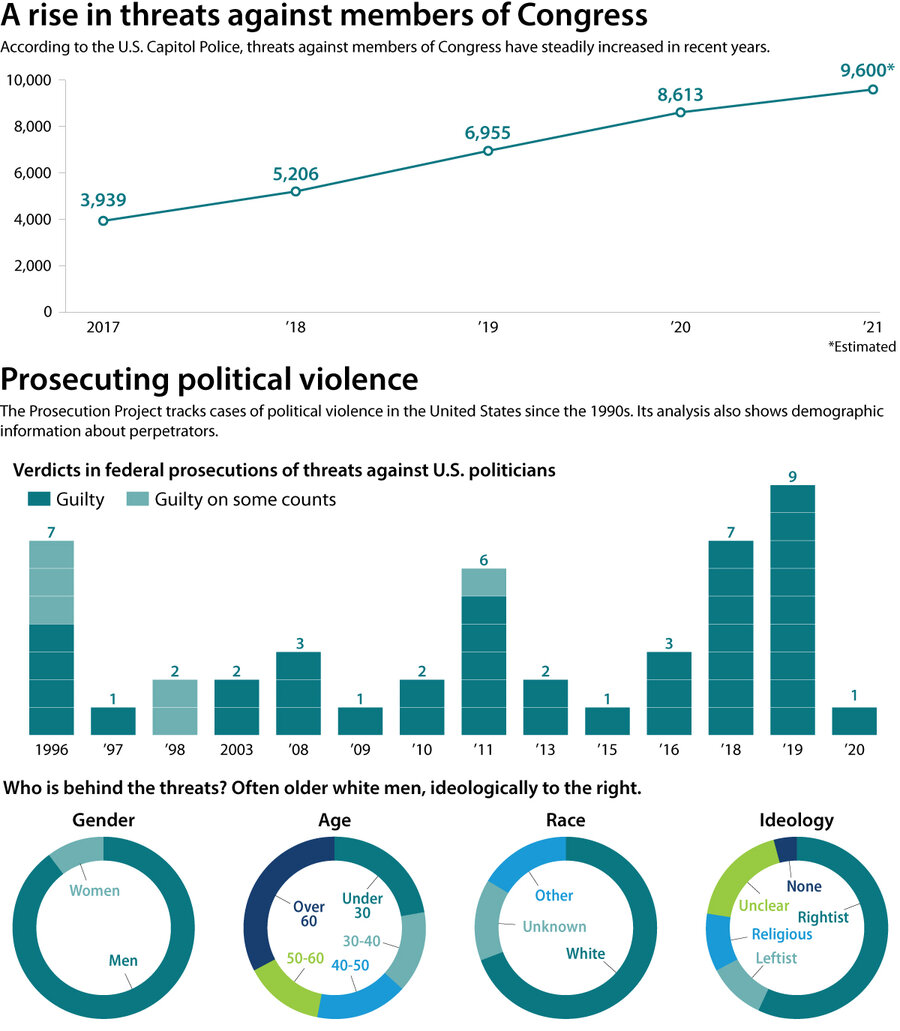Rage from the right: Threats against lawmakers rise for the GOP, too
Loading...
Threats of violence against U.S. lawmakers hit a new high in the aftermath of President Donald Trump’s 2020 election defeat and his subsequent impeachment over the Jan. 6 attack on the Capitol. The number of threats doubled last year to roughly 9,600, according to the Capitol Police, which has said its investigators are struggling to keep up with the workload.
The targets range across the political spectrum, but a shift is visible in a data analysis by the Prosecution Project, for the Monitor. Since the 1990s, the majority of felony prosecutions involved death threats by right-wing extremists against Democratic politicians.
Why We Wrote This
Most death threats against members of Congress come from the political right. But in a shift amplified by Jan. 6 and the Trump impeachment, they’re as likely to target Republicans as Democrats.
By contrast, the recent wave of indictments shows that pro-Trump individuals may be as likely to level death threats against Republicans as Democrats. No similar pattern has emerged on the political left.
Illinois Rep. Adam Kinzinger, one of only two Republicans serving on the House select committee on Jan. 6, which earned him the wrath of Trump loyalists, says by email that his office in Washington has seen “a large uptick” in violent calls and messages over the past year.
“I’ve noticed a decline in our civil discourse over the last 5 years, and it’s devolved to a scary point,” he says.
Threats of violence against U.S. lawmakers hit a new high in the aftermath of President Donald Trump’s 2020 election defeat and his subsequent impeachment over the Jan. 6 attack on the Capitol. The number of threats doubled last year to roughly 9,600, according to the Capitol Police, which has said its investigators are struggling to keep up with the workload.
Not all threats lead to arrests or prosecutions. When individuals do face criminal charges for making written or verbal threats, it can take years for their cases to be prosecuted. Courts must weigh the alleged crimes against free speech protections.
The menacing calls, voicemails, and other messages sent to Congress range across the political spectrum.
Why We Wrote This
Most death threats against members of Congress come from the political right. But in a shift amplified by Jan. 6 and the Trump impeachment, they’re as likely to target Republicans as Democrats.
A New York Times review of indictments since 2016 found that more than a third of cases involved threats by Republican or pro-Trump individuals. The targets included both Democrats and Republicans seen as disloyal to Mr. Trump. Nearly a quarter of cases were threats by Democrats against Republican lawmakers, the review found.
While it’s too early to know how many of these indictments will lead to convictions, this targeting suggests a shift from past decades.
A data analysis by the Prosecution Project for the Monitor found that since the 1990s, the majority of felony prosecutions involved death threats by right-wing extremists against Democratic politicians. A similar analysis in 2018 that included felony and misdemeanor prosecutions – a larger data set – also found that Democrats were far more likely to be targeted.
By contrast, the recent wave of indictments shows that pro-Trump individuals may be as likely to level death threats against Republicans as Democrats. No similar pattern has emerged on the political left.
Threats were reportedly made last year to Republican lawmakers who voted to impeach the president; others have since said they were targeted for voting with Democrats to pass an infrastructure bill.
Rep. Marjorie Taylor Greene, a Republican from Georgia, posted online the names and phone numbers of 13 GOP lawmakers who supported the bill and called them “traitors” on Twitter (her account has since been suspended.)
Earlier this year, a retired railroad worker pleaded guilty to making a death threat against Rep. Andrew Garbarino, a New York Republican who voted for the infrastructure bill. The defendant, who was ordered to take anger management classes, was upset that the congressman he voted for had “switched sides,” his attorney told the court.
Illinois Rep. Adam Kinzinger is one of only two Republicans serving on the House select committee on Jan. 6, which earned him the wrath of Trump loyalists and censure by the Republican National Committee. He also voted to impeach President Trump, and has announced he won’t run for reelection.
He told the Monitor his office in Washington has seen “a large uptick” in violent calls and messages over the past year, without giving specifics.
“I’ve noticed a decline in our civil discourse over the last 5 years, and it’s devolved to a scary point, where anger and vitriol are reflexive and the art of disagreeing without being disagreeable is all but lost,” he said by email.
The Prosecution Project analysis shows that felony prosecutions for threats against federal lawmakers and other elected officials remain rare, but have increased in recent years.
What remains broadly true is that white men of all ages are the most likely perpetrators. And felony convictions for threatening violence against federal officials end in long prison sentences, averaging more than 13 years.









